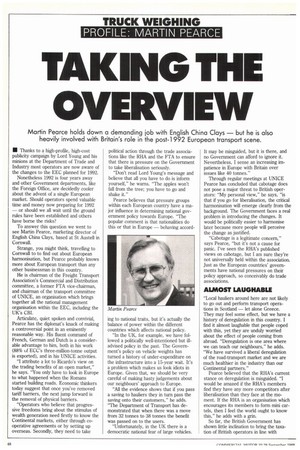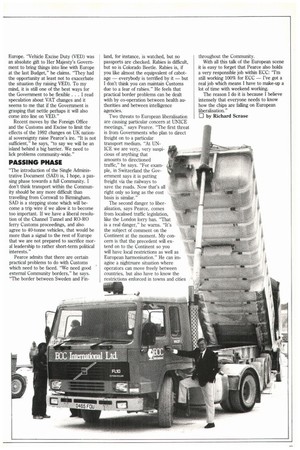TAKING THE OVERVIEW
Page 32

Page 33

If you've noticed an error in this article please click here to report it so we can fix it.
Martin Pearce holds down a demanding job with English China Clays — but he is also heavily involved with Britain's role in the post-1992 European transport scene.
• Thanks to a high-profile, high-cost publicity campaign by Lord Young and his minions at the Department of Trade and Industry most operators are now aware of the changes to the EEC planned for 1992.
Nonetheless 1992 is four years away and other Government departments, like the Foreign Office, are decidedly cooler about the advent of a single European market. Should operators spend valuable time and money now preparing for 1992 — or should we all wait until the ground rules have been established and others have borne the risks?
To answer this question we went to see Martin Pearce, marketing director of English China Clays, based at St Austell in Cornwall.
Strange, you might think, travelling to Cornwall to to find out about European harmonisation, but Pearce probably knows more about European transport than any other businessman in this country.
He is chairman of the Freight Transport Association's Commercial and Distribution committee, a former FTA vice-chairman, and chairman of the transport committee of UNICE, an organisation which brings together all the national management organisation within the EEC, including the UK's CBI.
Articulate, quiet spoken and convivial, Pearce has the diplomat's knack of making a controversial point in an eminently reasonable way. His fluent command of French, German and Dutch is a considerable advantage to him, both in his work (88% (A ECC's three-million-tonne output is exported), and in his UNICE activities.
"I attribute a lot to Ricardo's view on the trading benefits of an open market," he says. "You only have to look in Europe to what happened when the Romans started building roads. Economic thinkers today suggest that once you've removed tariff barriers, the next jump forward is the removal of physical barriers.
"Operators who believe that progressive freedoms bring about the stimulus of wealth generation need firstly to know the Continental markets, either through cooperative agreements or by setting up overseas. Secondly, they need to take political action through the trade associations like the RHA and the FTA to ensure that there is pressure on the Government to take liberalisation seriously.
"Don't read Lord Young's message and believe that all you have to do is inform yourself," he warns. "The apples won't fall from the tree; you have to go and shake it."
Pearce believes that pressure groups within each European country have a major influence in determining national government policy towards Europe. "The popular comment is that nationalities do this or that in Europe — behaving accord ing to national traits, but it's actually the balance of power within the different countries which affects national policy.
"In the UK, for example, we have followed a politically well-intentioned but illadvised policy in the past. The Government's policy on vehicle weights has turned a history of under-expenditure on the infrastructure into a 15-year wait. It's a problem which makes us look idiots in Europe. Given that, we should be very careful of making hasty judgements about our neighbours' approach to Europe.
"All the evidence shows that if you pass a saving to hauliers they in turn pass the saving onto their customers," he adds. "The Department of Transport has demonstrated that when there was a move from 32 tonnes to 38 tonnes the benefit was passed on to the users.
"Unfortunately, in the UK there is a democratic national fear of large vehicles. It may be misguided, but it is there, and no Government can afford to ignore it. Nevertheless, I sense an increasing impatience in Europe with Britain over issues like 40 tonnes."
Through regular meetings at UNICE Pearce has concluded that cabotage does not pose a major threat to British operators: "My personal view," he says, "is that if you go for liberalisation, the critical harmonisation will emerge clearly from the background. The Government faces a real problem in introducing the changes. It would be politically easier to harmonise later because more people will perceive the change as justified.
"Cabotage is a legitimate concern," says Pearce, "but it's not a cause for panic. I've seen the RHA's published views on cabotage, but I am sure they're not universally held within the association. Just as the European countries' governments have national pressures on their policy approach, so conceivably do trade associations.
ALMOST LAUGHABLE
"Local hauliers around here are not likely to go out and perform transport operations in Scotland — let alone Greece. They may feel some effect, but we have a history of deregulation in this country. I find it almost laughable that people coped with this, yet they are unduly worried about the effect of people coming from abroad. "Deregulation is one area where we can teach our neighbours," he adds. "We have survived a liberal deregulation of the road-transport market and we are much healthier in the industry than our Continental partners."
Pearce believed that the RHA's current stance on deregulation is misguided. "I would be amazed if the RHA's members find they have any more competitors after liberalisation than they face at the moment. If the RHA is an organisation which encourages its members to form mini cartels, then I feel the world ought to know this," he adds with a grin.
So far, the British Government has shown little inclination to bring the taxation of British operators in line with Europe. "Vehicle Excise Duty (VED) was an absolute gift to Her Majesty's Government to bring things into line with Europe at the last Budget," he claims. "They had the opportunity at least not to exacerbate the situation (by raising VED). To my mind, it is still one of the best ways for the Government to be flexible. . . I read speculation about VAT changes and it seems to me that if the Government is grasping that nettle perhaps it will also come into line on VED."
Recent moves by the Foreign Office and the Customs and Excise to limit the effects of the 1992 changes on UK national sovereignty raise Pearce's ire. "It is not sufficient," he says, "to say we will be an island behind a big barrier. We need to Lick problems community-wide."
PASSING PHASE
"The introduction of the Single Administrative Document (SAD) is, I hope, a passing phase towards a full Community. I don't think transport within the Community should be any more difficult than travelling from Cornwall to Birmingham. SAD is a stepping stone which will become a trip wire if we allow it to become too important. If we have a liberal resolution of the Channel Tunnel and RO-RO ferry Customs proceedings, and also agree to 40-tonne vehicles, that would be more than a signal to the rest of Europe that we are not prepared to sacrifice moral leadership to rather short-term political interests."
Pearce admits that there are certain practical problems to do with Customs which need to be faced. "We need good external Community borders," he says. "The border between Sweden and Fin land, for instance, is watched, but no passports are checked. Rabies is difficult, but so is Colorado Beetle. Rabies is, if you like almost the equipvalent of cabotage — everybody is terrified by it — but I don't think you can maintain Customs due to a fear of rabies." He feels that practical border problems can be dealt with by co-operation between health authorities and between intelligence agencies.
Two threats to European liberalisation are causing particular concern at UNICE meetings," says Pearce, "The first threat is from Governments who plan to direct freight on to a particular transport medium. "At UNICE we are very, very suspicious of anything that amounts to directioned traffic," he says. "For example, in Switzerland the Government says it is putting freight via the railways to save the roads. Now that's all right only so long as the cost basis is similar."
The second danger to liberalisation, says Pearce, comes from localised traffic legislation, like the London lorry ban. "That is a real danger," he warns. "It's the subject of comment on the Continent at the moment. My concern is that the precedent will extend on to the Continent so you will have local restrictions as well as European harmonisation." He can imagine a nightmare situation where operators can move freely between countries, but also have to know the restrictions enforced in towns and cities throughout the Community.
With all this talk of the European scene it is easy to forget that Pearce also holds a very responsible job within ECC: "I'm still working 100% for ECC — I've got a real job which means I have to make-up a lot of time with weekend working.
The reason 1 do it is because I believe intensely that everyone needs to know how the chips are falling on European liberalisation."
by Richard Scrase










































































